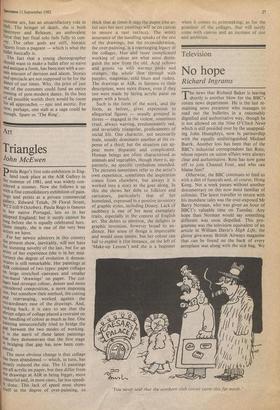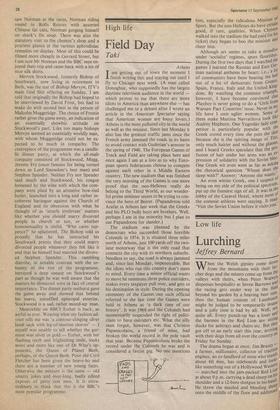Television
No hope
Richard Ingrams
rri he news that Richard Baker is leaving
shortly is another blow for the BBC's rotten news department. He is the last re- maining news presenter who manages to read out the bulletins in a reasonably dignified and authoritative way, though he is not allowed on the Nine O'Clock News which is still presided over by the unappeal- ing John Humphrys, now in partnership with the equally undistinguished Michael Buerk. Another loss has been that of the BBC's industrial correspondent Ian Ross, whose reports on union affairs were always clear and authoritative. Ross has now gone off to join Channel Four, and who can blame him?
Otherwise, the BBC continues to feed us with a diet of funerals and, of course, Hong Kong. Not a week passes without another documentary on this now most familiar of colonies. The latest traveller to return with his mundane tales was the over-exposed Mr Barry Norman, who was given an hour of BBC1's valuable time on Tuesday. Any hope than Norman would say something different was soon dispelled. This pro- gramme was the television equivalent of an article in William Davis's High Life, the glossy give-away British Airways magazine that can be found on the back of every aeroplane seat along with the sick bag. We
'You never said that the northern club circuit came this jar north.'
saw Ncirman at the races, Norman riding round in Rolls Royces with assorted Chinese fat cats, Norman gorging himself on shark's fin soup. There was also the statutory visit to the chemist's shop and a prurient glance at the various aphrodisiac remedies on display. Most of this could be filmed more cheaply in Gerrard Street, but I am sure Mr Norman and the BBC men en- joyed their trip and came back with a lot of nice silk shirts.
Mervyn Stockwood, formerly Bishop of Southwark, now living in retirement in Bath, was the star of Bishop Mervyn, ITV's main God Slot offering on Sunday. I am told that originally the Bishop had hoped to be interviewed by David Frost, but had to make do with second best in the person of Malcolm Muggeridge. The choice of Frostie rather gives the game away, an indication of an essentially showbiz attitude on Stockwood's part. Like too many bishops Mervyn seemed an essentially worldly man, with whom Muggeridge could not be ex- pected to be much in sympathy. The centrepiece of the programme was a candle- lit dinner party, at which the all-male company consisted of Stockwood, Mugg, Jeremy Fry (once famous for being turned down as Lord Snowdon's best man) and Stephen Spender. Neither Fry nor Spender said much and Stockwood, his tongue loosened by the wine with which the com- pany were plied by an attentive bow-tied butler, launched into a long and rather in- coherent harangue against the Church of England and its obsession with what he thought of as 'utterly irrelevant' matters like whether you should marry divorced people in church or not, or whether homosexuality is sinful. 'Who cares tup- pence?' he spluttered. The Bishop told us proudly that he has instructed his Southwark priests that they could marry divorced people whenever they felt like it and that he himself had married the divorc- ed Stephen Spender. This rambling diatribe, in notable contrast with the ur- banity of the rest of the programme, betrayed a deep unease on Stockwood's part as though he was well aware that the matters he dismissed were in fact of central importance. The dinner party outburst gave the game away and showed that behind his suave, unruffled episcopal exterior, Stockwood is a sad, rather mixed-up man.
Meanwhile on BBCI Esther is back, as awful as ever. Wearing what my fashion ad- viser tells me was 'a contour-clinging silver lame sack with leg-of-mutton sleeves' — I myself was unable to tell whether the gar- ment was silver or gold — Esther, with her flashing teeth and frightening smile, looks more and more like one of Dr Who's op- ponents, the Queen of Planet Beeb, perhaps, or the Queen Beeb. Poor old Cyril Fletcher has been given the heave-ho and there are a number of new young faces. Otherwise the mixture is the same — old smutty jokes and over-long, badly edited exposés of petty con men. It is extra- ordinary to think that this is the BBC's most popular programme.



































 Previous page
Previous page